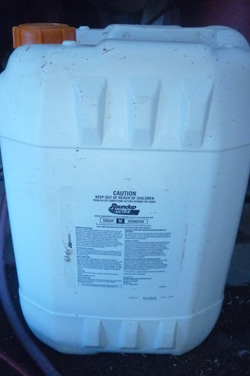 |
|
| > Welcome > Health Reporter > Part 2 Researching Glyphosate
|
|
|
Hello dear friends How patient you all are! The last year has been full. We have been through trials, received blessings and moved our family and belongings from Australia to New Zealand. And each day I wonder, "Will this be the day I can tell you some good news about living in a world drenched with glyphosate?" For those of you who are joining us today for the first time, I'd like to say, "Hi, wherever you are. My prayer is that the living God and His only begotten Son Jesus Christ enlighten you with Their Holy Spirit, lovingkindness and unsurpassed love for YOU. Yes YOU!" Many are the experiences in this life, some are good, some are not so good, and yet we can learn from each experience (often painfully, as we search our souls). In times of trouble and in settled times, the joy which comes through communication with God is beyond words. Sometimes just a Bible text appears in the mind, sometimes a “knowing” as you read a passage from the Bible. Sometimes, a sense of deep peace in the room when meditating on God’s truth. To me, this is the best experience in life. Is there Good News about Researching Glyphosate?So. Since we published Part 1 Poisoning by Glyphosate, hundreds of hours have been spent praying, researching and praying again! My aim was to share positive actions we can take to live in a world seemingly saturated with glyphosate. As each piece of research was dug up and examined, the more difficult I found writing. I think I became disillusioned that something so obvious and damaging as glyphosate was being ignored and in fact encouraged by local and national governments, and enthusiastically used by all kinds of farmers. In fact, I started writing this column in March 2017. I could write thousands of words on the damage and consequences of a glyphosate drenched planet. But what we need now is hope and practical knowledge! What can you and I do right now, today to help our bodies and minds cope with living with glyphosate, as one of many toxins in our air, water, soil and food? Most Used Herbicide on the PlanetI encourage you to reread Part 1, an exploration into the most used "herbicide" on planet earth - which is called "glyphosate". So much more information has been published in the past year, so keep your mind and eyes open! A little catch up: Glyphosate is the “active” ingredient in many herbicide products available anywhere you want to look, in most places on Planet Earth. Hardware stores in cities, towns, villages, supermarkets, groceries, corner stores, milk bars, dairies. There is always a bottle of weed killer. In New Zealand in August 2016, an island nation of less than 5 million people, there were 94 trade name products registered as containing glyphosate. When I emailed a friend, Tom, to let him know I was researching glyphosate, he came right back and said he had been thinking about the very same issue. So he and some friends put together this video. They found an amazing array of information and some positive steps we can take to protect our health. https://www.youtube.com/watch?v=B4-nEFYlWAc&t=6s Many, many of us in the human family continue to believe that glyphosate is harmless to all life except plants. This is patently false, and one of those rabbit holes I fell into during researching, because in this 21st century world – money is power. The propaganda machine, oiled by the love of money, is alive and well throughout the world, and the latest evidence of this is the EU member nations voting NOT to phase glyphosate out, even though presented with overwhelming evidence of its destructive processes on life. There are many articles reporting on this EU vote, here is one: https://euobserver.com/environment/140042 Next column, positive actions each of us can do to live more cleanly. We will start with an individual approach. Let the truth make us free!
Posted: Mon 29 Jan 2018 |
|
|
